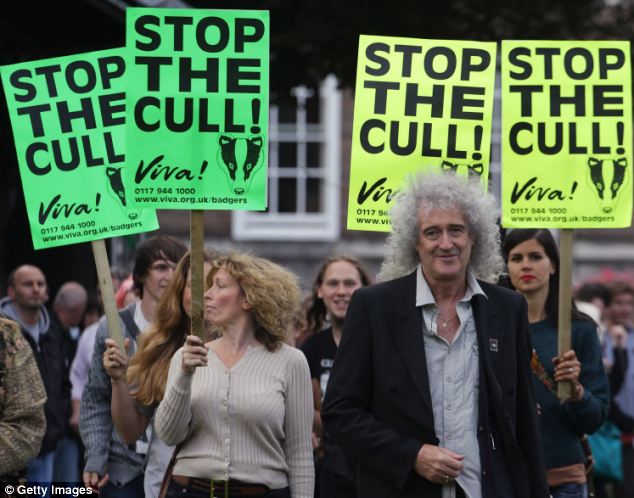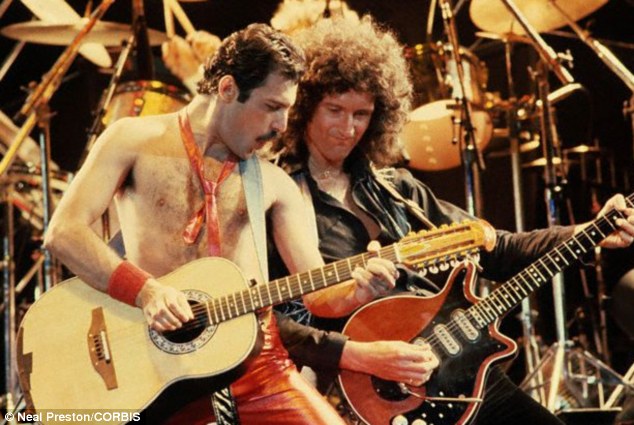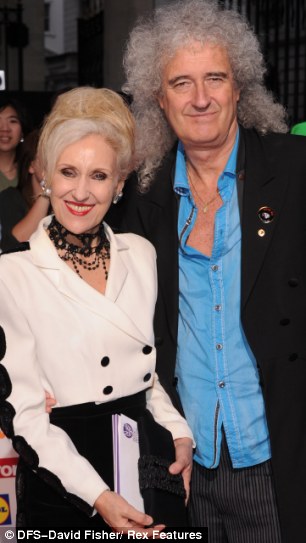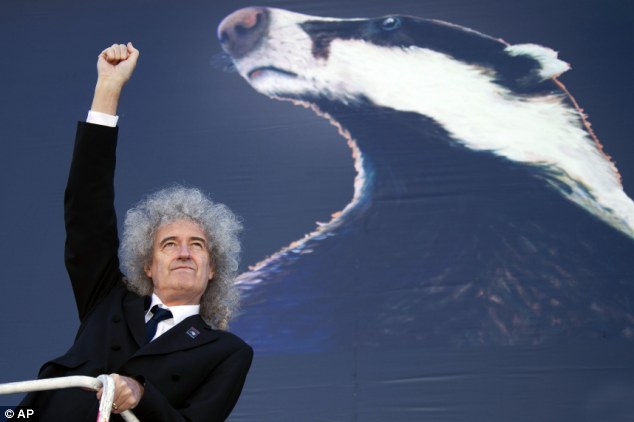 – IT’S LIKE THE FIGHT TO END SLAVERY
– IT’S LIKE THE FIGHT TO END SLAVERY
– BRIAN MAY ON WHY HE WON’T GIVE UP HIS CONTROVERSIAL BATTLE – DESPITE TERRIFYING DEATH THREATS
DAILY MAIL
18 October 2013 by NICOLE LAMPERT
Opposite: Passion: Brian May, pictured at the 2012 London Olympic Games, is protesting against the badger cull
Brian May looks tired, but that is hardly surprising. While other 60-something rock stars have long retired to the sun with their latest wives — returning only for the odd wallet-boosting ‘best of’ CD and arena tour — the Queen guitarist is working like a man possessed.
He was up until 5am for the third day in a row.
‘You could say I’m a bit obsessive,’ he says, shrugging his shoulders. ‘I’m not an easy person to live with. My wife is still baffled. She can’t understand why I spend so many working hours on these strange projects. The problem is I have too many passions.’
That’s putting it mildly. There is still, of course, the music.
The night before our meeting he was playing guitar on stage at We Will Rock You, the Queen musical which is defying the critics, who hated it, by celebrating its 12th year in the West End. He has also recently returned from Los Angeles, where he and bandmate Roger Taylor performed at an event called iHeartRadio which was said to have attracted a billion listeners.
And he is also trying to make a movie about his much missed friend and Queen frontman Freddie Mercury.
There are, too, the badgers.
Thanks to his passion for Britain’s wildlife he has found himself becoming a political animal despite his non-confrontational character and is a figurehead for the thousands who don’t believe that brocks should be culled.
And astronomy; a few years ago he finished his PhD in astrophysics which he had started more than three decades earlier at Imperial College London, just before he made the choice to put his music before his science. He has written two books on the subject and is executor of his good friend Patrick Moore’s will — as well as being in charge of archiving the late astronomer’s work.
He’s also petitioning for Sir Patrick’s show The Sky At Night to be kept on by the BBC despite plans to ditch it in December. And now there is something completely different. Brian has produced a book of some of the weirdest pictures you could probably ever see.


They are ‘diableries’, ghoulish 3D images of hell, as envisaged by different artists. They were widely sold in England and France in the 1860s and, in spite of the terrifying subject matter, became highly collectable. Brian has designed his own viewer to make the pictures spring to life and has teamed up with two diableries specialists to tell the stories behind the images and compile the book. It has been very much a labour of love; you might say his first love. Brian first saw a 3D picture as a small child when free sets were given away in packets of Weetabix.
The cards showed pictures suitable for the breakfast table — sporting heroes and historic events.
He had to send off 1s 6d for a viewer and was immediately obsessed. ‘It felt like magic and that magic has never left me,’ he says. ‘I became entranced by what 3D could do as opposed to flat normal photography. It’s like walking through a window to the world. It’s a passion that bit me and has never gone away.’
He found his first diablerie while searching in London’s Portobello market: ‘It was something so mysterious and exciting I was hooked.’
He stops and asks if he can take a picture of me with his 3D camera. He has thousands of them of Mercury and the rest of the band. Brian speaks forcefully about his passions, but in person he is surprisingly meek and modest; he’s certainly the most gentle and softly spoken rock star I have ever met. And while other rock ’n’ rollers got up to all sorts of infamous stuff on tour, he sought out dealers of stereoscopic pictures, not drugs.
‘I made the decision very early on when people were doing drugs around me that they weren’t for me,’ he says. ‘I felt that I was quite delicate and I wanted to keep my brain pure. I came through the psychedelic time with a clear head and I never regretted it.’
Besides, he had more fruitful obsessions. Brian came to have one of the biggest collections of diableries in the world but the hard work started once he decided to put this book together. Many of the cards were damaged so he set to work restoring them.
‘I’m a little insane,’ he says. ‘But I love doing this stuff. And the more I did the more precious these pictures became to me.’ He strokes a copy of his book as he says this.

His phone rings — it’s his wife, the former EastEnders actress Anita Dobson. They make plans to see each other around midnight at their West London home when they have both finished their various activities. She has barely seen him for days. The couple have been together for nearly 30 years after meeting at a party; at the time he was married with three young children.
He looks sad when he recalls the impact that meeting had. ‘Divorce is hard, especially when there are children involved,’ he says.
Their relationship has sometimes been rocky but they married 13 years ago and are as involved as ever — ‘even if she wonders why I spend 25 hours a day on all my projects’.
You can’t really blame her. He’s 66 now and a grandfather — does he never think about slowing down?
‘But I am still following my dreams,’ he says, smiling. ‘I do think about slowing down and I talk about it but it never happens because there is so much to do and I enjoy it all. Even the badger stuff, which is painful and is confrontational, which I am not really made for, but I enjoy the small victories that we achieve.’
Ah, the badgers. I had been warned Brian might be reluctant to talk about them because he has been left so upset by the recent pilot culls — badgers are accused of spreading bovine TB — but it’s a passion he obviously cannot stop thinking about.
‘As I get older it is hard to keep my energy levels up but having spent a lot of my time campaigning for animals it is something I could never withdraw from now I know what goes on,’ he says. That is despite death threats and hatred directed at him.
 Partnership: Brian May has been married to Anita Dobson since 2000
Partnership: Brian May has been married to Anita Dobson since 2000
‘I make a lot of friends but I make a lot of enemies as well. There are a lot of people out there who are desperate to hang on to their right to abuse creatures. I get a lot of hate and abuse and threats. I haven’t involved the police but I keep a record of it all and my lawyers have a nice collection of stuff which is actionable. I prefer to keep moving and to work with the positive element of things. I would prefer not to take action, but the day may come when I have to. Working for these animals is a tough place to be; it’s like being in a war every day of your life and not knowing where the next bullet is coming from. Under this Government I would say law and order in the countryside has completely broken down because prosecutions for fox hunting are so few and far between.’
He used to be a Conservative, but now feels completely disillusioned with British democracy.
‘I’ve now spent a lot of time in Parliament and I’m appalled to see how democracy is unfolding every day,’ he says. ‘It’s very upsetting to see how little power the normal person in the street has. We had a petition on the Government’s website and we had 100,000 signatures which entitles you to a debate on the subject. We had the debate, won the debate, we defeated the Government and it made no difference whatsoever. You have this illusion that people can participate in democracy, but in fact it leads to nothing.’ He looks downcast but rouses himself.
‘We will do it,’ he says, quietly. ‘It must have seemed impossible in the days of William Wilberforce that slavery could be abolished or that women could get the vote. Exactly the same forces were aligned against them as are against us now, but in the end it’s clear what is right and what is wrong. It should be a given that any creature or person that is defenceless should be treated decently.’
Brian funds a rescue centre in the grounds of his Surrey home and his sympathy has always extended to humans, too. He bought Patrick Moore’s home for him after the astronomer faced financial difficulties and admits he still dearly misses Sir Patrick, who died last year aged 89.
‘It feels quite strange not having him around,’ he says. ‘He was like a benevolent uncle who I loved. He was very inspiring to me when I was growing up and as he got older he became somebody who needed looking after in his autumn and winter years. Along with his other friends I was happy to ensure that he was able to stay in his house with his things around him.
‘He was an absurdly generous man and he gave all his money away. Any kid who wrote to him and said, “I want to be an astronomer and I haven’t got any money” — Patrick would give them money to buy a telescope. He adopted people and put them through university.
He was an extraordinary man but the sad thing is some people took advantage of him and that wasn’t nice to see. In the end he had nothing left of all the money he had earned over the years. He had given it all away.
‘So we had to look after him because the nation gives him a knighthood but it doesn’t care that he starves. If we hadn’t bought the house he would have had to go into a home, which would have been a tragedy. All the books he wrote in his latter years would never have happened. He was a national treasure, but the nation didn’t really appreciate him.]

the national Team Badger campaign last year ahead of the cull
‘It would have been lovely to turn his home into a museum but all the advice I have had is it’s not very practical; the last thing he would have wanted was for us to set something up that would not work and would gradually decay and become an embarrassment.’
So Brian is working with the Science Museum to create a permanent exhibition dedicated to Moore’s work.
Another dear friend he still misses is Freddie Mercury. After Mercury died in 1991, closely followed by Brian’s father, he was so distraught that he contemplated suicide and checked into a clinic for help. He is obviously a lot stronger now, but there is still a fragility to him.
‘Freddie is still part of everyday life for me, I do miss him,’ he says. ‘He is always part of my work. It feels like he is still around.’ That is one reason why he is determined to make a forthcoming Mercury biopic the best it can be. There were many rumours that it was in trouble when Ali G and Borat star Sacha Baron Cohen, who was to play the singer, announced he was no longer part of the project in July. But Brian, one of the film’s producers, says they simply felt they had to recast because Baron Cohen was too well known.
‘We now have a new director and I think we have found our perfect Freddie,’ he says. ‘He is an up and coming actor, not an incredibly well-known face, which is good because we want the Freddie on screen to be believed. We don’t want people to be distracted by a famous face.’
‘That’s what was wrong with Sacha, really — we have a huge amount of respect for him, but in the end we realised it wasn’t going to work because people would see Sacha Baron Cohen on screen rather than Freddie Mercury.
‘That became apparent to us when we saw Sacha in Les Miserables and Hugo. It was a tough one, really hard, because he had great enthusiasm. He remains a good friend. But, painfully, we thought we had to bite the bullet.’
There are lots of meetings going on to try to get the film off the ground. Meanwhile, Brian is off to launch the American tour of We Will Rock You and promote his diableries book.
I ask Brian how he manages to fit it all in. He yawns. ‘I don’t sleep,’ smiles the hardest-working man in rock.
Diableries by Brian May, Denis Pellerin & Paula Fleming is out now (London Stereoscopic Company, £40). Brian and his co-authors will talk about the book at the British Library, London NW1, on October 30: www.bl.uk/whatson